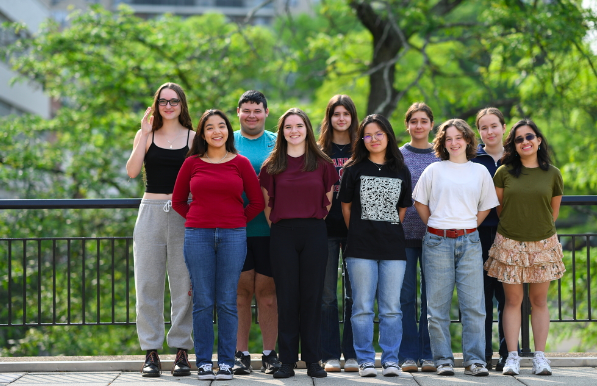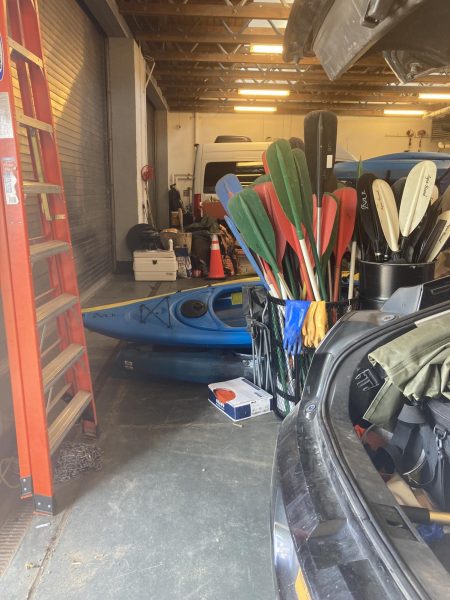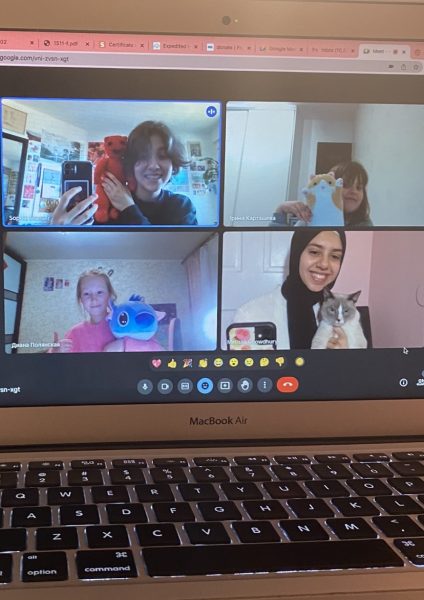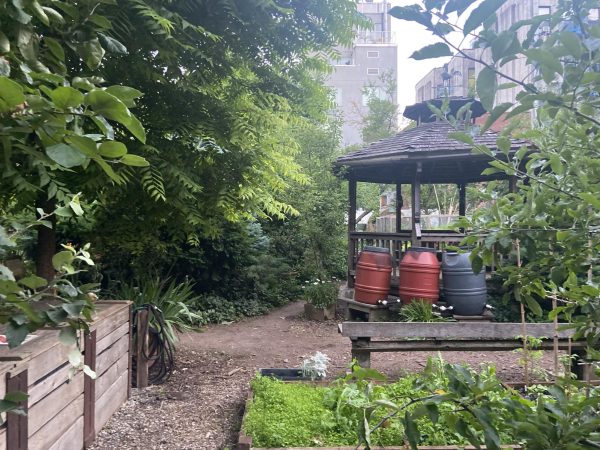Summer 2023 Advice Column: Using Time Off Productively and Tips on the College Process
The Copy Chiefs, Managing Editors, and Editors-in-Chief of ‘The Science Survey’ are here to answer your questions about summer, college, and more.

Above are the Period 2 Editors in Chief and Copy Chiefs for ‘The Science Survey.’ In the back row from left to right are Felicia Jennings-Brown ’23, Ethan Weinberg ’23, Sela Emery ’23, Katia Anastas ’23, and Nora Sissenich ’23. In the front row from left to right are Elizabeth Colon ’23, Monica Reilly ’24, Tiffany Wang ’24, Helen Stone ’23, and Katrina Tablang ’23.
Hello, Bronx Science!
We, the Copy Chiefs, Managing Editors, and Editors-in-Chief of The Science Survey, are excited to present the Summer 2023 Advice Column, which will tackle lots of questions about the summer and the college process. We hope our insights as graduated seniors will help you greatly, and we wish you all the best for the summer!
With lots of love,
Katia Anastas ’23, Sela Emery ’23, Helen Stone ’23, Katrina Tablang ’23, Ethan Weinberg ’23, Felicia Jennings-Brown ’23, Nora Sissenich ’23, Elizabeth Colón ’23, Monica Reilly ’24, and Tiffany Wang ’24
Katia Anastas: What should I do over the summer?
First and foremost, recharge. The school year is generally very draining and taking time to relax, doing things you love, and spending time with friends and family is incredibly important for your overall well-being and will allow you to feel refreshed in the fall. For example, I devoted a lot of time to doing things I could not fit into my schedule during the school year, namely visiting childhood friends and exercising more regularly.
Second, devote some time to some meaningful, more productive activities. Whether you are tutoring at your local middle school, working at a restaurant, completing research, or catching up on reading, it is important to continue accumulating new experiences, broadening your academic horizons, and of course, adding a few things to your overall résumé.
If you are a rising senior, it is vital to start working on your college applications over the summer. During the school year, you will not have the same time to truly perfect everything from your common app essay to your activities list. While focusing on your application for your early decision school is important, make sure to work on other applications as well, given that it is very difficult to achieve early entry to many of the nation’s selective schools.
So, my core advice is to maintain a balance between relaxing and working. Don’t lose sight of your overarching goals, but also don’t be consumed by all-absorbing pursuits.
Nora Sissenich: What makes for a good college essay?
There are many different college essays you will have to write — some prompts are more common (“why this college?”, “why your major?”, “describe a meaningful extracurricular experience”, etc.) while some colleges get a little more unique and creative with their prompts. But in writing any essay for college, there’s a few things you should keep in mind.
First, any college essay (whether it’s the common application essay or a supplement) tells a story about you to admissions officers. Think about the story you want to tell about yourself. Who are you as a student? As a person? How have your experiences shaped who you are and what you want to pursue academically? Admissions counselors want to see how you will bring unique assets to their learning community. Good college essay writers use the various essays they submit to colleges to tell different parts of their story (since you only get so few words!)
In telling a story about their writers, good college essays showcase passion, ambition, devotion, and ability to introspect. This might vary a bit based on the prompt — a “why college” essay is more about showing your passion and genuine interest in a school than introspection — but in answering any prompt you should be looking to showcase who you are as a student and learner. Your passion for your academic interests/chosen path of study should be clear from your essay alone. Incorporating how your experiences with extracurriculars, class, research, reading, family, or in life overall have shaped who you are and what you’re passionate about is a key part of doing this.
Finally, good college essays are well-written and well-edited. While there’s no one way to be a good writer, I would recommend having someone you trust to give constructive and helpful feedback (whether it’s a friend, older student, parent, teacher, or guidance counselor) read over your essays. They can help you to catch any mistakes you may have missed, edit for clarity and conciseness (since those word counts can be tight!) and ensure that you’re portraying the important parts of yourself in the best light.
Helen Stone: How should I develop my college list?
The typical advice that you’ll receive when you ask this question is that your list should be a good mix of safeties, targets, and reaches — or in other words, schools that you’re likely to get into and schools you’re less likely to get into. While this is important, the key to developing a strong college list is to really hone in on what you’re looking for and the type of environment that you want. Then, you should build your list with schools that meet this criteria. This may mean that your college list doesn’t look like your friends’, or that you’re applying to different colleges than everybody else — and that’s okay! Don’t apply to all of the most popular schools just because everybody else is or because they seem like the “best” schools, because they might not be the best fit for you. My goal when applying to college was to apply to schools that other people weren’t applying to because it made me stand out more.
Maybe you don’t know exactly what you want in a college right now; that’s okay. Start doing research. If you’re interested in a particular field, search what colleges have the best programs in that field. If you want to be in a city, only look at schools that are in cities, for instance. Another important aspect to consider is student life and the student body. For this, I would recommend attending student panel webinars that many schools host on Zoom in order to learn about what types of students go to a given school. You could also reach out to a current student via Instagram or Facebook if you want a less structured way of learning about a school.
The big takeaway here is to do your research and apply to schools that you’re excited about and that will actually be a good fit for you. The name, prestige, or acceptance rate of the school doesn’t matter – what matters is the type of learning environment that will give you the best experience.
Ethan Weinberg: How can I avoid procrastination over the summer?
Of course, I don’t recommend that you spend your entire summer preparing for the next school year or working on college applications. However, that doesn’t mean you should completely abandon your academic pursuits for two and a half months.
If you’re an underclassman, prioritize summer assignments and prepare for your classes. Whether it is completing your summer reading for English class or doing pre-readings for AP and honors classes, get ahead wherever you can. Coming into a challenging course with a preexisting base of knowledge is crucial and will give you a leg up in terms of understanding and comprehending material. I suggest doing at least three pre-readings for each of these classes, helping you gain some insight into what you might learn later on. Many people worry about taking AP courses due to the accelerated pace and difficulty, but if you use this strategy and the time over the summer to your advantage, it can feel much easier to navigate.
For upperclassmen (especially rising seniors), you need to be much more conscious of how you allocate your time. College applications open on August 1st, and as someone who just went through this process, I suggest getting started immediately. Work at least an hour each day on applications and essays, and try to have a rough draft of your personal statement completed by the beginning of the school year. Senior year English teachers will dedicate the first few weeks of class to helping you workshop these essays, so coming into class with a draft will make this process much more manageable. If you finish working on that essay, don’t hesitate to get started on supplemental essays unique to each school. You don’t want too many distractions in the fall, which can make the application process more challenging, especially for schools with deadlines on or before November 1st. Having to complete applications alongside your school work and extracurricular commitments can become a strain on your grades that, importantly, get sent to colleges and will factor into their admissions decisions.
If you get started early on these tasks and remain proactive throughout the summer, you should be able to avoid procrastinating, setting you up for a successful school year (and college process) ahead.
Monica Reilly: What are the most important pointers for a successful junior year?
Junior year is often described as being the hardest year of high school, the year when your grades go down the drain and your mental health is challenged. Not only is it described as being one of the more difficult years in a person’s life, but the mental health and grade struggles are seen as inevitable.
This year will be difficult, but there are ways to alleviate the difficulties so that you can prosper rather than suffer. Time management — as clichéd as it may sound — will be key. You don’t need an aesthetically pleasing journal to manage your time well. Writing down important things, such as upcoming tests or projects, will help keep you on task (I recommend using the school planner for this, which you will receive on the first day of classes in September). Spreading out your workload over a long period of time will help prevent burnout, such as studying for a test 20 minutes everyday for a week instead of staying up until two in the morning the night before.
Utilize your free time effectively. Do you have to wait a half an hour until your bus arrives? Get started on your math homework, or read a chapter of your book for English class. If you don’t have a lot of homework on a Monday, and you have a project due that Friday, get started so you only have to do a little every day. This will help you maintain a consistent and healthy sleep schedule, which will help you to complete your homework more efficiently, so you will perform better in school.
Reaching out to your guidance counselor can also mitigate stress you may have about the college process. Ask them for advice — figuring out how to apply to colleges is not supposed to be something you have to deal with on your own, and your guidance counselor is there to guide you and help make your process easier.
If you see that a current Bronx Science senior is going to your dream school, don’t hesitate to ask them about it. They can help give you advice on what that college is looking for, and how you can improve your chances of getting accepted.
Junior year can seem foreboding, but there are ways to make it an enjoyable experience instead of a grueling one. Never be afraid to ask for help, and remember that there are so many people in Bronx Science and beyond that are here to help you throughout high school.
Sela Emery: How can I find good internships?
The first step to finding any good internship is to research your options. Keep in mind that the earlier you do this, the better. Most summer internships have application deadlines months before the program starts, oftentimes way earlier than one might expect. Although you might be searching for a summer opportunity to keep busy in July or August, you will probably have to apply in the very early spring.
Another thing to keep in mind is that the research you do should be specific and guided by a certain field or focus you wish to study. Rather than looking for ‘prestige’ or exclusivity in an internship, gear your search towards a specific category that you know you are interested in. From business to biology, make sure that you stick to one field.
Doing so entails reaching out to people you know who are studying the same subject. Whether it be an older friend or family member, connections are key. The people you know might inform you about an internship program they are running or one they participated in that they greatly enjoyed. In order to find internships through mere word of mouth, remember to reach out to the people you know.
Felicia Jennings-Brown: How can I effectively manage my time as a first semester senior?
As a first semester senior, you have a lot of things on your plate that you didn’t have last year. I remember thinking to myself in the spring of junior year that there was no way that high school could get harder than it was then – I don’t say that anymore, but chances are that if you follow these tips, you’ll be able to get through your first semester without too much difficulty.
- Centralize your information. Keep one list or calendar or page of your planner dedicated to the due dates of the various forms and applications you will have to fill out for college. Some college applications close as early as November 1st, while others let you apply as late as August. The Free Application for Federal Student Aid (FAFSA) can be filled out anywhere between October 1st and June 30th. Scholarships often have oddly specific deadlines. Knowing when everything opens and closes is the first step to completing everything as effectively as possible. This will also help you block out time for and stay on top of your regular homework.
- Stay on top of deadlines. Not to state the obvious, but the earlier you complete your applications, the less you have to worry about. On top of that, you’re going to want as much time as possible to revise, correct, and perfect the information that you’re sending to your potential home for the next four years.
- Take advantage of the resources that are available to you now. Your guidance counselor may not know everything, but they do want to see you get into the college of your dreams. Arrange meetings with them. Chances are, they’ll know a tip or two every step of the way that’ll help make your application process much smoother.
- Block out time for lengthy applications. Personally, submitting my FAFSA took an unexpectedly large amount of time because I had to coordinate getting the information from both of my parents (who are separated) to complete it. Look over your applications, talk to your counselor, and do whatever else you must to figure out which ones might take a while. Plan accordingly, and don’t let writing applications bleed into the time you need to do your other work.
- A tip that professional writers use is that if you’re unable to complete something in the amount of time that you set aside, get down as much as you can and then plan out the rest, so you know what you have left to do later. I used this tip on several of my essays, and they came together very quickly when I came back to what ideas I’d left off.
Katrina Tablang: What do you wish you knew when you started the college process?
The college process looks a little different for everyone. There are some general steps any rising senior can take to make it easier on themselves, including starting essays early and researching colleges, but beyond that, everyone is going to “market” themselves on their applications in their own ways.
If you have an interest in a specific field of study, make sure to highlight that in your application somewhere. Your essays and interviews are your best chance to humanize yourself to the admissions committee, but your grades and extracurriculars can still be used to tell a story. I recommend going through all your extracurriculars sometime at the beginning of the application process and searching for links between them that you can leverage in essays and interviews — you might be surprised by what you can come up with! For instance, I realized while writing my application that I could draw a connection between leading A Cappella Club and being an editor for the newspaper since they both revolve around helping develop student voices. Connections like that are great for making your application feel more cohesive.
It’s also important to strike a balance between being idealistic and practical. Apply to any school you can see yourself enjoying your time at because you never know what will happen, but make sure you have a few schools that are likely to be affordable for you, so that you don’t find yourself in a position where all of your college choices are out of your budget.
Beyond that, remember that the college process isn’t everything — life is bigger than what college you wind up at. You’ll have avenues for improvement no matter where you go, so long as you keep your mind open to them. Don’t waste your senior year in an anxious spiral about college acceptances — there’s only so much you can control about the process. Just do your best and make your peace with whatever comes of it. It’ll be over before you know it!
Elizabeth Colón: What is the best way to start preparing for senior year?
At the end of your junior year, your guidance counselor will schedule a meeting with you to discuss preparing for senior year. You should have already received a colored sheet that lists out the College Process Timeline; make sure you tape it up on your fridge, above your desk, or somewhere else you can always see it! That sheet is going to guide you and help you stay organized through these next couple of months.
One of the best ways to prepare for senior year and make things easier for you in the future is by doing extensive research on colleges and visiting them whenever possible. There are so many advantages to visiting colleges, even if you only have a remote interest in them. This can easily help you narrow down your college list by finding out what interests you in a college campus and community.
While you’re working on narrowing down your college list, create a Common Application account and start your personal essay. Try to help yourself as much as you can and reduce future stress once your senior year begins by starting early and making at least a rough draft of your personal statement , which all colleges that use the Common App will receive.
Another reason why you want to start narrowing down your college list is to prevent yourself from writing extra supplemental essays beyond what is actually necessary. You should begin drafting your supplemental essays as soon as possible after colleges release their applications in early August . Having to write countless supplemental essays in a few day’s time is less than ideal, so make sure you don’t procrastinate and are absolutely sure you want to spend a good amount of your time writing for each school to which you will be applying.
You should also start thinking about your résumé; many colleges want to see one attached to your application. Think about starting a passion project, and begin applying for any programs you want to be involved in. While colleges want to see that you did something over the summer, like volunteering, an internship, or a job, you should make sure you do something you’re passionate about. Don’t simply do things that you think colleges want to see.
Remember, your counselors have been preparing you for this since your ninth grade year! This is going to be your last summer in high school, so make sure to stay balanced and prepare yourself for senior year while saving some time for yourself and your friends.
Tiffany Wang: How do you cope with stress over the college process?
As the summer advances, many juniors, like myself, are overwhelmed with college applications. How do you start? When do you start? How do you manage stress throughout the process?
I have a few pointers:
Most importantly, use your time wisely. Make sure you start your applications over the summer instead of cramming them in days before the deadline . This way, while everyone else is stressing over juggling their courses, extracurriculars, and college applications, you can solely focus on your courses and extracurriculars. It may not seem like a big difference now, but when the time comes, you will be thankful that you started early.
With all the college applications, it is easy to find yourself overwhelmed. In those cases, the best thing to do, as simple as it may seem, is to take a well-deserved break. Let your brain cool off before it completely shuts down. Go out with friends, talk about something other than the college application, and release your pent-up stress.
One of the best things about being a Bronx Science student is the vast amount of resources we have, from guidance counselors to teachers. Do not hesitate to ask questions to them, as they would be more than willing to help you. A guidance counselor’s job, as the name suggests, is to provide guidance to students, whether that is personal or academic. Many of them have been guidance counselors for quite a long time, and they are far more experienced at providing college advice than you may think. Do not be afraid to ask and reach out.
Good luck on applications, everyone!
As a first semester senior, you have a lot of things on your plate that you didn’t have last year. I remember thinking to myself in the spring of junior year that there was no way that high school could get harder than it was then – I don’t say that anymore, but chances are that if you follow these tips, you’ll be able to get through your first semester without too much difficulty.
Katia Anastas is an Editor in Chief for ‘The Science Survey.’ She loves that journalistic writing equally emphasizes creativity and truth, while allowing...
Sela Emery is a Copy Chief for 'The Science Survey.' She focuses on art history, covering relevant art pieces and exhibitions with each issue. In addition...
Helen Stone is the Editor in Chief and Facebook Editor for 'The Science Survey.' She is interested in journalistic writing because she believes that a...
Katrina Tablang is a Copy Chief for 'The Science Survey.' She enjoys journalistic writing because it enables her to explore a wide variety of perspectives...
Ethan Weinberg is an Editor-in-Chief for 'The Science Survey.” Ethan enjoys journalistic writing, as he believes that by making sense of the issues on...
Felicia Jennings-Brown is a Copy Chief for ‘The Science Survey.’ What she appreciates the most about journalistic writing is its use as a channel to...
Nora Sissenich is an Editor-In-Chief for 'The Science Survey,' a role that she values deeply because it allows her to offer guidance and insight through...
Elizabeth Colón is a Copy Chief for ‘The Science Survey.’ Elizabeth finds that the most appealing aspect of journalistic writing is how much...
Monica Reilly is an Editor-in-Chief for ‘The Science Survey.' She has always loved using the art of journalism to educate and connect with people. She...
Tiffany Wang is a Managing Editor and Advisory Editor for ‘The Science Survey.’ As an avid fan of stories, whether they are nonfiction or fiction,...










